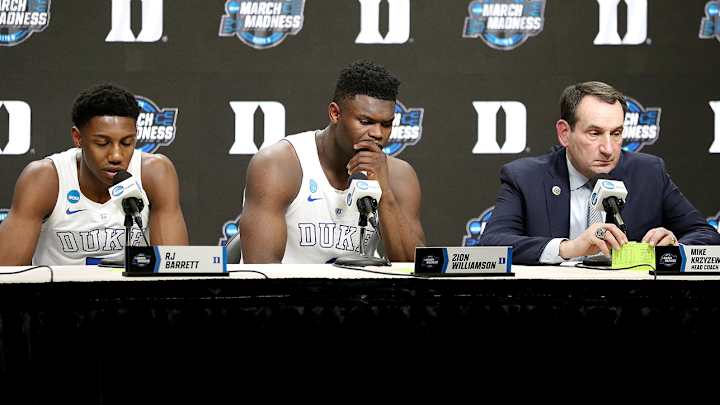How Will Duke's Star-Crossed Season of Zion Be Remembered?

Considering Duke had just escaped consecutive rounds of the NCAA tournament thanks largely to two point-blank, last-gasp shots that rolled precipitously off the rim (Aubrey Dawkins and Ahmed Hill, this one’s for you), it was not altogether unsurprising that the Blue Devils’ 2018–19 season ended with a loss to Michigan State. The Spartans’ story is one of persistence, and it continues on to the Final Four in Minneapolis after a thrilling 68–67 win. In the meantime, trying to contextualize what Duke did (and didn’t) accomplish this season will be a tricky task. It’s unclear if that can be done without being inflammatory (and my television will be on mute Monday morning either way), but here we go.
First of all, take a moment to appreciate Zion Williamson, who turned in the type of transcendent college season we are gifted once per decade and did it in a way so visceral that no statistical qualifiers are necessary to back it up. Winning awards and making 74% of your two-point field goals tend to take a backseat to stuff like “bending space and time,” “forcing writers to look up new adjectives,” and “making people who hate Duke all the way to their core at least sort of enjoy watching Duke.” They did, in the end, lose just three times with him in the lineup. In all likelihood, we won’t see much of Williamson from now until NBA Summer League. The circumstances obviously aren’t ideal, but everyone can agree that he probably deserves the break.
Discussing what Duke as a whole failed to accomplish is a bit more complicated. Should any coach, or any freshman-dominated team, ever be expected to win a championship? Noting the standards to which Duke likes to hold itself, the bar was inarguably high. This was always destined to be one of the teams people talk about in bars and basements forever, and it moves on into that canon with only an ACC tournament title to show for it. Granted, Duke likely would have won the conference’s regular season with a healthy Williamson. But noting that he returned in immediate peak form and that Duke earned the top overall seed anyway, there aren’t many excuses that suffice when it comes to missing the Final Four. The Blue Devils did, however, put themselves on the precipice of getting there, and that’s all most teams ever ask for.
After all, the consensus on Selection Sunday was that Michigan State were the ones handed an unkind draw, as a two-seed that could have been a one-seed dropped into the same region as the team nobody else wanted to play. As it turned out, this Spartans team had grown increasingly tenacious and confident over the past month, and in hindsight, it was Duke who would certainly have rather played somebody else. That the Blue Devils lost probably isn’t as earth-shattering as it seemed to the host of Zion-loving 12-year-olds across the country (or the Zion-loving 21-year-olds in Durham). But the way it ended did invite the question of why.
That why was R.J. Barrett hoisting—and airmailing—a needless go-ahead three attempt from far atop the arc with 14 seconds left. After Duke recovered his miss, Mike Krzyzewski gave the ball back to Barrett, who found his way to the line, missed a free throw he was trying to make, and then made one he was trying to miss. Duke lost by one. Williamson’s final shot attempt came with 1:44 left in the game. Before that, he’d gone five entire minutes of clock without shooting. From the outside, it’s hard to know when or where or even if the ball was supposed to go to him down the stretch, but it’s equally hard to fathom why it hardly ever did.
At the end of it all, the way Duke went down was more or less a byproduct of how it had played all year. If you watched the Blue Devils lose to Gonzaga in Maui, you knew the drill. If you followed the team from start to finish, it made enough sense that Krzyzewski’s approach from the start was to simplify, rather than complicate. When you have a big, athletic team of freshmen that can destroy people in transition and dominate within controlled chaos, led by a superstar in Williamson who does both better than perhaps any player we’ve seen don a college uniform, you let them play. It wasn’t quite just rolling the balls out and sitting down, but Krzyzewski chose to let his guys be themselves.
As far as Williamson was concerned, there clearly weren’t many holes in his skill set that his athleticism couldn’t cover for at this level. Still, there were times he could be too unselfish, and times where it seemed like he had to do everything on both ends. Barrett’s flaw has always been his bouts of late-game bullheadedness, which resurfaced at the bitter end. Cam Reddish had his moments, and played through what the team labeled a knee injury on Sunday, but his reputation for showing up on an irregular basis had been more or less cemented over the course of previous five months. Tre Jones made the other guys better, but his 22-point outburst against Virginia Tech was just the third game all season in which he drained multiple threes.
Duke won and lost with those tendencies and the flaws that accompanied them all year, right down to Barrett’s overeager three-ball that drove the nail in. So, Duke lost, and with Williamson, Barrett, Reddish and perhaps Jones all off to the pros, the eulogizing will probably be brief. The blame will probably be spread around, and it won’t really matter. But, all things considered, the Blue Devils went down late in a one-possession game, freshmen on the floor, exactly the way you might have pictured it. It was not a complicated death.
